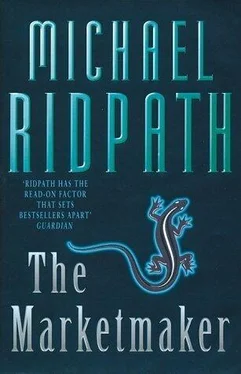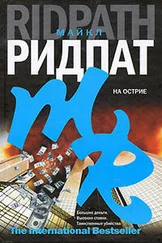Ricardo smiled. ‘I like the fact you’re aware of your own limitations. But it was a good choice. And you’re right, I wouldn’t have put on the position if I hadn’t agreed with you. As a matter of fact, I haven’t sold it, I’ve bought more. A lot more.’
‘That’s good. I hope it works out well,’ I muttered, and turned back to my book.
We sat in silence for a while, but I was aware of Ricardo’s eyes on me. ‘It’s been a tough week for you, hasn’t it? First being attacked, and then losing the favela deal.’
‘It has,’ I mumbled.
‘It must be very frightening to be attacked like that.’ I glanced up at Ricardo. His eyes were sincere. So sincere. As though he had been knifed himself.
‘It was,’ I said. ‘First we were just walking along the beach. And then suddenly I had a knife sticking out of my chest.’
Ricardo nodded. ‘Brazil’s a cruel country. It has this wonderful exterior, but underneath it can be brutal. It’s a great shame. That’s one of the reasons the favela deal was such a good idea.’
I hadn’t wanted to be drawn on this, but I couldn’t help myself. ‘Then why did you destroy it?’
‘I had no choice. I couldn’t let Bloomfield Weiss win that mandate. It would have meant the end of Dekker Ward.’
‘Oh, come on. We would still have had the largest share of the market. And something would have been done about those favelas. Now, all those people will just be left to crawl around in their own garbage.’
‘I’m not responsible for the social conditions of Brazil, or any other country for that matter,’ said Ricardo, calmly. ‘Over the last hundred years Brazil has had the same access to capital, natural resources and labour as Canada and the United States. The reason it’s a poorer country is entirely to do with the Brazilians and how they have decided to use or misuse those resources, not with me.’
I listened, making no attempt to hide the cynicism I felt.
‘My responsibility is the success of Dekker Ward,’ he went on. ‘I’ve built it into one of the most successful investment banks in the world, but the moment I sit back, the moment I let anyone else take the initiative, it will all be over. Oh, of course, we all make out it’s a friendly market, and that all the other guys are happy to let us run things. But they’d love to see us trip up. They’d love it even more if they could take over from us. My biggest fear is that we get complacent.’
His blue eyes bored into mine. ‘There comes a time when you have to play tough. Bloomfield Weiss should not have stolen the deal from us like that. They were playing tough. I had to show them, and everyone else, that I could play tougher.’
‘And what about the children in those favelas ?’
‘If the Favela Bairro idea is as good as we think it is, it will get financed eventually. And, remember, it was Dekker who brought international capital back to Latin America when every other bank in the world had turned their back on it. We’ve organized more than twenty billion dollars of finance for the region. You know how badly these countries need that capital. And they’re using it properly now, investing to create jobs, and improve infrastructure.’
He saw the doubt in my eyes.
‘OK, I won’t pretend that’s the main reason why I’ve built up Dekker into what it is now. But it’s an important result of what I’ve done, and I’m proud of it.’
‘And what about all the money you make?’
‘Oh, come on, Nick! You told me that was the reason you wanted to join us.’
‘Yes, but—’
‘But what?’
‘I wanted money to do something. To buy myself freedom to do what I wanted with my life.’
‘And?’
‘And...’ I hesitated, trying to find the right words. ‘I just think that, at places like Dekker, money seems to be an end in itself.’
Ricardo rubbed his chin. ‘I know what you mean. But it’s not quite what it seems. As I keep saying, I like people who are hungry, people who need to make money for themselves. Then they end up making it for the firm as well, and the firm grows. And that’s good. But I don’t think it’s greed, exactly.’
‘What is it, then?’
‘Money is the score. I suppose I just want to have the highest score when it’s all over.’
‘And when’s that?’
Ricardo smiled. ‘Good question. I’m not sure. I suppose for me it’s a game without end.’
We fell silent for a moment, thinking about what the other had said and both surprised at how personal the conversation had suddenly become. I remembered the T-shirt I had seen in the favela: Who dies with the most toys wins. Ricardo’s game was played all over the world, by rich and poor.
He waved to an attendant, and asked for a Cognac. I ordered a whisky. We both sat back in the huge first-class seats, and sipped our drinks.
‘My father played the game and lost,’ Ricardo said.
‘Jamie said he’s a businessman in Venezuela?’
‘Was. He died about fifteen years ago.’
‘I’m sorry.’
‘He was a deal-doer himself, in the oil industry. He came to Caracas from Argentina in the fifties, and built up quite a portfolio of interests. But then he overstretched himself. It was nineteen eighty, just after the second big oil-price hike. He thought oil was going to forty dollars a barrel. It went down to six. He always used to drink, but after that he drank more. He died four years later. He left us with very little in the end, so we had to make our own way. Which I’m proud of.’
‘Did he teach you much?’
‘The truthful answer is no. We didn’t really see much of him, he was always away doing deals, and I was away at school in England. But I think I inherited his nose for a deal. I just hope I know when not to go too far.’
‘So you think you’re competing against him?’
Ricardo thought this over for a moment. ‘In a way, yes. I would have liked him to have seen what I’ve achieved. He never gave me much praise when he was alive, perhaps he would now.’
‘And your mother?’
‘Oh, I don’t think my mother knows what I do, or cares. As long as I have enough money to keep her bank balance healthy.’
‘What about Eduardo? Does he take after your father too?’
Ricardo smiled ruefully. ‘Eduardo inherited a different set of characteristics from our father.’
I desperately wanted to ask Ricardo what those were, but there was something in his tone that suggested I had already gone far enough. He was a fascinating man, and I felt privileged that he had allowed me to learn more about him. But was he just manipulating me with his frankness? If so, I could feel it working.
Ricardo put down his glass, and turned to me. ‘Look, I know you find what you’ve seen difficult to take. I know you’re questioning the whole premise of what we’re doing. And I respect that. Honestly. I would rather have people who question first principles than those who blindly do what everyone else does. So think about it. But don’t pretend that you can work in finance, take the rewards and avoid the tough decisions.’
His blue eyes held mine. They were sincere. I knew he believed in what he was saying. And those eyes were inviting, persuasive, almost hypnotic. Join me, they said.
‘I want you to work for Dekker. You’ll be right in the middle of the most exciting market in global finance today, and you’ll have a hell of a lot of fun too. I think you can do a lot for us. But you need to be committed. If you don’t buy into what we’re doing, then go back to your Russian books. You decide.’
I swallowed. I remembered that when I had originally taken the job at Dekker I had played through this dilemma in my mind. Then I had decided that if I was to succeed in finance, I would have to accept the ethical system that came with it. And it wasn’t immoral, just amoral. As Ricardo had said, the reason that Brazil was in such a mess was that the Brazilians had made it that way. The same could be said of Russia, that other great sprawling, chaotic country. Isabel’s father had liked Tolstoy’s story of the Master and Man, and its nobility was appealing. But the Master had been foolish to insist that he and his servant drive on in the snow instead of waiting at the inn for the storm to clear. And, in the real world, masters just didn’t give up their lives for their servants.
Читать дальше












